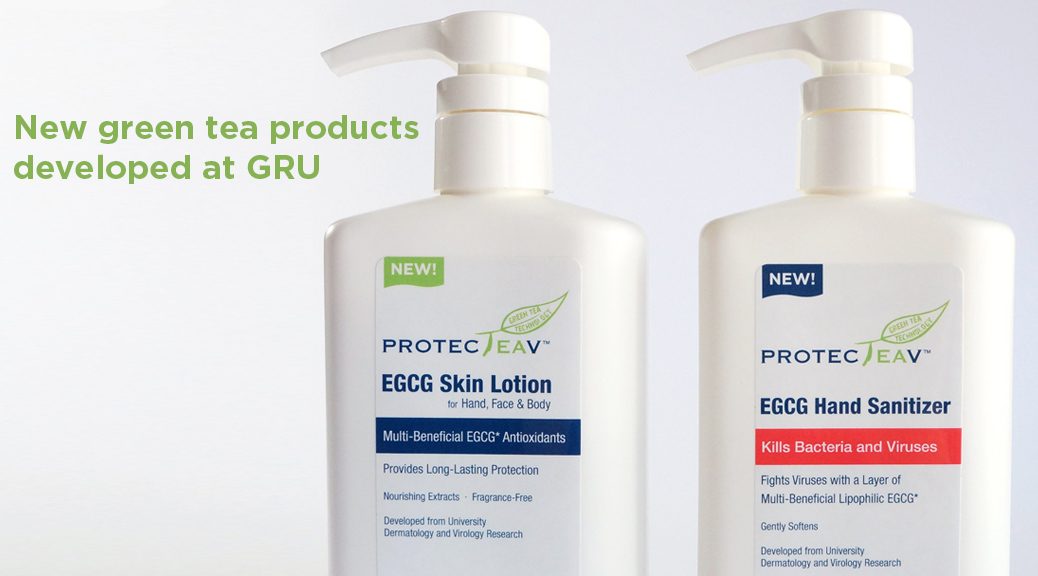AUGUSTA, Ga. – Hand sanitizers are more popular than ever – and so are myths about the products.
“We get a lot of questions about hand sanitizers and their uses. Are they safe? Are they effective?” said Dr. Stephen Hsu, a Georgia Regents University researcher with a growing line of green tea products.[mks_pullquote align=”right” width=”300″ size=”22″ bg_color=”#ffffff” txt_color=”#002664″]Schedule an interview with this expert.
Contact Kelly Jasper in media relations at 706-724-4706 or kjasper@gru.edu.[/mks_pullquote]
His start-up biotechnology and drug development company Camellix, LLC, uses green tea-derived technologies to treat dry mouth, dandruff, and cold sores with natural ingredients. Now, Hsu has turned his attention to creating a better hand sanitizer and lotion using compounds derived from green tea.
“People have come to expect that they can use a hand sanitizer to help protect themselves during cold and flu season,” said Hsu, Professor of Oral Biology, Oral Health & Diagnostic Sciences in the GRU College of Dental Medicine. “That’s true, but in reality, hand sanitizers have so much more potential.”
Hsu’s ProtecTeaV® EGCG Hand Sanitizer and EGCG Skin Lotion use a modified epigallocatechin-3-gallate (EGCG) compound derived from green tea because it’s got the potential to protect against an extensive range of deadly or debilitating viruses. The new hand sanitizer and lotion are available in pharmacies and online starting this summer. Here, Hsu tackles five common myths about hand sanitizers:
Myth #1: Hand sanitizers only prevent colds.
“Studies in a number of research journals show us that EGCG protects human cells from infection of HIV, herpes, norovirus, hepatitis B and C viruses, human papilloma virus, even Ebola, according to recently published antiviral research by the U.S. Army Medical Research Institute of Infectious Diseases ,” said Hsu, a recipient of the 2015 Georgia Bio Innovation Award. “The significance of this technology is the potential to save thousands, if not tens of thousands, of lives from a variety of viral infections.”
As a result of the research, Camellix plans to donate shipments of its new EGCG sanitizer and lotion to military personnel fighting the spread of Ebola in West Africa.
Myth #2: Hand sanitizers replace hand washing.
“Soap and water are still the best way to clean the skin. When they’re not available, hand sanitizers are a great option,” Hsu said. “Sanitizers work best when your hands aren’t overly dirty or greasy, so if it’s possible, you always want to wash or wipe down your hands first to remove visible grime.”
Myth # 3: All hand sanitizers are created equally.
Most sanitizers kill bacteria and some viruses with alcohol, which evaporates in about 20 seconds. “This is fine for immediate cleansing if applied correctly, but it is temporary,” Hsu said. “The key is to provide a long-lasting barrier against viruses. The unique ProtecTeaV® formulation provides a 2-hour barrier by combining alcohol with lipophilic EGCG, a compound patented by Georgia Regents University.”
Myth # 4: Sanitizers kill all bacteria and viruses.
Most bacteria can be killed by alcohol-based sanitizers, but in order to effectively kill viruses, the concentration of alcohol must be very high, or about 90 percent,, which is dangerously flammable.
“With norovirus, for example, the US Centers for Disease Control and Prevention recommends washing hands with soap and water frequently to prevent infection instead of relying solely on alcohol-based sanitizers,” Hsu said. “The rabies and polio viruses are also resistant to alcohol. Compounds to kill these alcohol-resistant viruses are urgently needed. We believe EGCG, especially lipophilic EGCG, is an excellent candidate.”
Myth #5: There is no wrong way to use hand sanitizer.
“The sanitizer can’t do its job if it isn’t applied properly,” Hsu said. “Put a nickel-sized dollop of the product in the palm of one hand and rub hands together, until the surface of your hands and fingers are coated. Keep rubbing until dry. For the best results, wash and dry your hands before using hand sanitizer, then follow with lotion.”
About Dr. Stephen Hsu
Dr. Stephen Hsu, Professor of Oral Biology, Oral Health & Diagnostic Sciences in the College of Dental Medicine at Georgia Regents University, earned a bachelor’s degree in biochemistry from Wuhan University after a six-year forced labor experience in a rural farm in China.
After moving to the United States, he earned a Master of Arts degree in molecular biology from Montclair State University in New Jersey and a Ph.D. in cell biology and anatomy from the University of Cincinnati College of Medicine.
Dr. Stephen Hsu is founder of Camellix, LLC, which develops and markets products using green tea-derived technologies to treat dry mouth, dandruff, cold sores, and viral infections with natural ingredients. The products were developed and patented in the Georgia Regents University Life Sciences Business Development Center in the Office of Innovation Commercialization. Hsu joined GRU 1999 and serves as Course Director for both Nutrition and Biochemistry courses. He has joint appointments in the Institute of Molecular Medicine and Genetics, GRU Cancer Center, and VA Medical Center Augusta.
More information
Learn more about ProtecTeaV® EGCG Hand Sanitizer and Skin Lotion at www.camellix.com or the GRU Office of Innovation Commercialization at www.gru.edu/oic.
 Augusta University
Augusta University




